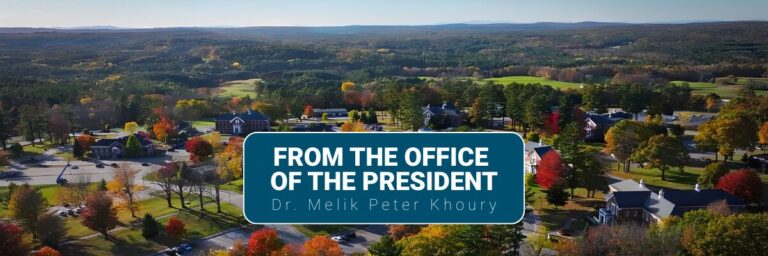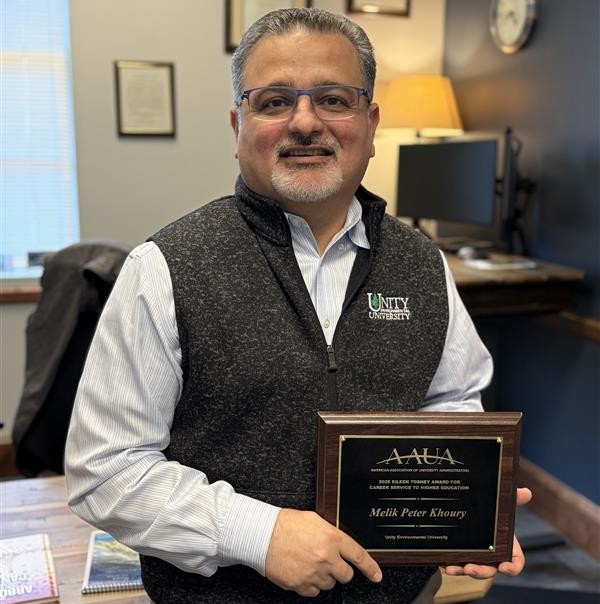Unity College has entered into a relationship that is bringing research and education projects to Allen Island, considered the family retreat of famed painter Andrew Wyeth.
During the spring and summer of 2014, the 450 acre private island located four miles off the coast of Port Clyde, Maine, is serving as a focus for three academic projects funded by the Up East Foundation. The projects were selected from a slate of proposals submitted by several of the academic centers of study at Unity College.
Michael Evans, Ph.D., Provost and Vice President for Academic Affairs, says that additional proposals were presented to the Up East Foundation at the end of the 2013-14 academic year in May.
“Allen Island presents us with many opportunities,” Evans said. “One is it opens up the coast for us. What we have been doing is taking students to state parks to give them access to marine biological habitat. But with Allen Island, obviously we have something much more direct and much more exclusive. This a partnership we’re developing that delivers access to our students and faculty. Obviously, being an island, it has a lot of shoreline. It allows us to do many projects that we can’t do at a state park.”
The three projects are framed by Unity College’s first-in-the-nation sustainability science focus for teaching and learning, a collaborative approach that works across academic disciplines to address the most complex, pressing environmental problems of the 21st century, including the mitigation of global climate change.
One of the three projects, a biodiversity baseline survey that is being conducted by four Unity College scientists from the Center for Biodiversity, has the potential to develop valuable data over time on the effects of global climate change on the Maine coast. Such data may eventually save the lobster industry — and other Maine coastal fisheries — by helping to develop effective strategies to mitigate the ravages of global climate change.
Amy Arnett, Ph.D., Professor of Ecology and Director of the Center for Biodiversity, is studying beetles and ants on the island. Amanda Baker, Instructor of Biology, is studying the pollination activities of bees. David Potter, Ph.D., Professor of Fisheries and Aquatic Sciences, will study plankton, butterflies and birds. Emma Perry, Ph.D., Associate Professor of Marine Biology, is studying tardigrades, which are tiny organisms that can thrive in some of the most hostile conditions on earth, from the deepest Maine lakes to the vacuum of outer space.
“We’re going to put it all together,” said Arnett of the projects. “There is no information on Allen Island in the (scientific) literature or even with the citizen science databases.” She says that the information gathered during this project funded by the Up East Foundation will contribute to broader research projects in the future.
The second project funded by the foundation brings two other scientists from the Center for Biodiversity to the Island. Aimee Phillippi, Ph.D., Associate Professor of Biology and Pamela MacRae, Ph.D., Assistant Professor of Sustainable Fisheries Management, are studying rockweed habitat for juvenile lobsters and fish.
The third project is intended to spark transdiciplinary (collaborative) environmental problem solving across the disciplines.
During the summer, faculty members who have committed to teaching in the general education program at Unity College, which includes keystone classes, distribution requirements, community-based learning, and environmental studies, will travel to the island to participate in a transdisciplinary problem solving education workshop. The keystone classes are Unity Experience, an entry level orientation course for new Unity College students, Environmental Issues and Insights, and Environmental Scenarios and Solutions.
“Because of the nature of these classes, the work done there will affect the experience of every student at Unity College,” said Sarah Cunningham, Ph.D., Assistant Professor and Director of the Center for Experiential and Environmental Education.
Participants will share ideas about ways to encourage Unity College students to think deeply about sustainability, and define their roles as environmental citizens, says Cunningham.
They will also use part of their time to gather information for future reference.
“Faculty will explore the island to identify areas where student and faculty research projects may be appropriate in the future,” explained Stephanie Wade, Ph.D., Assistant Professor of Writing and Director of Writing.



